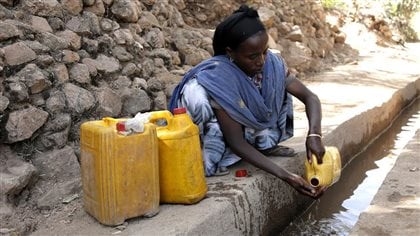Ethiopia is making headlines internationally as a result of the ongoing drought that has ravaged the country. Without sufficient rain over the last two years, crops have failed and people are going hungry again.
Over the last couple of days, however, there are reports of intense rains that caused flooding and left 28 people dead. In the drought-stricken region of Afar, the floods are adding to the crisis. The Ethiopian Broadcasting Corporation said five people were killed as waters rose across what is the lowest point in Ethiopia and one of the lowest in Africa. In some areas over 54 mm fell in 24 hours.
Marnie Davidson of CARE Canada is just back from Ethiopia. She says the initial responses to the widespread hunger and malnutrition have been a success, but she says it’s time to put the needs of Ethiopians in the spotlight to ensure a major crisis is averted.
Listen
Davidson says all the pregnant women in the hardest-hit areas are suffering from moderate to severe malnutrition, which puts their health and the health of their babies at risk. It is the cumulative effect of poor nourishment over the last two years.
Davidson is too young to remember the international response to the famine in Ethiopia in the mid-1980’s, but she is impressed with the response to this current situation. She says the Ethiopian government played a key role in coordinating help and facilitating the early engagement from UN agencies and international NGO’s.
Organizations such as her own have been prepared and well-placed to be very effective. CARE is now supporting 500,000 people in Ethiopia with food aid, assisting over 150,000 children and mothers affected by malnutrition. They also engaged in rehabilitating water points that provide over 290,000 people access to safe drinking water in the current drought.
Now it remains to be seen how these floods will affect the aid work and the overall environment.







For reasons beyond our control, and for an undetermined period of time, our comment section is now closed. However, our social networks remain open to your contributions.